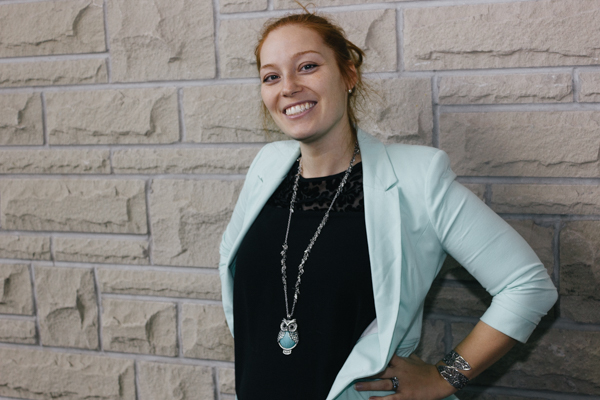Admissions
Equity, Diversity, Inclusion and Decolonization
The School of Graduate and Postdoctoral Studies is committed to equity, diversity, inclusion and decolonization in all aspects of graduate and postdoctoral studies. For more information regarding these commitments please visit grad.uwo.ca/edi-d.
Nursing
Master of Science in Nursing (MScN)Meet Ashley Mckeown, MScN candidate in Nursing

Supervisor: Yolanda Brenda Babenko-Mould
Why did you come to Western for your graduate degree?
After exploring different graduate nursing programs, and consulting research conducted by possible thesis supervisors, I felt that the Arthur Labatt Family School of Nursing would be able to provide me with the courses and mentors that would enable me to develop myself further in a nurse educator role, and provide me with the strongest foundation in nursing research.
Where’s your favourite place on campus?
There are several places I frequent on campus, depending on the type of work I am doing. The collaborative learning spaces at Taylor library are wonderful for group work, allowing up to eight people to work on a single document together on a large screen. If I am in a serious writing or research mode, I prefer a private study corral in a silent area of Taylor Library or Weldon Library. In contrast, when I am trying to think creatively, I like to sit in the Mustang Lounge in the University Community Centre.
What’s your favourite book?
Oryx and Crake by Margaret Atwood (well…I love the entire MaddAddam trilogy)
Have you taken any professional courses that Western makes available to grad students?
I have taken many courses through the Teaching Support Center to work towards completing the Western Certificate in University Teaching in Learning, such as the Teaching Assistant Training Program, Advanced Teaching Program, and several of the Future Professor workshops. These courses were invaluable in my development as a nurse educator. They have connected me with many other graduate students in different disciplines, providing opportunities to exchange knowledge, share ideas, and enhance creativity within my own practice. I have gained so many insights into the learning process at a university level, which has transformed how I teach nursing students.
Program Websites
Program Contact
Shayna McKay (gradnurs@uwo.ca)Graduate Program Assistant
FIMS & Nursing Building
Western UniversityRoom 3308
London, Ontario N6A 5C1
t. 519-661-2111 x83409
Western's Master of Science in Nursing (MScN) program is the longest-standing graduate nursing program in Canada, and provides the basis for leadership in professional Nursing and the foundation for doctoral studies. This flexible research-based program provides opportunities for co-op study as well as the option to fast-track to the PhD Program after the first year of full-time study.
Program Length
- 6 Terms (Full-time study)
- 9 Terms (Part-time study)
Program Design
- Full-time study or part-time study
- Thesis-based
Funding Information
Applicants are encouraged to apply for the following scholarships (if eligible):
Tuition and Fees
Tuition and fee schedules (per term) are posted on the Office of the Registrar's website at http://www.registrar.uwo.ca/student_finances/fees_refunds/fee_schedules.html
Graduate Student Affordability Calculator
Use this helpful tool to estimate how much money you will need to pay for your tuition, fees, housing, food, and other necessities for a 12-month (three term) academic year.
Admission Requirements
Both general and program-specific requirements must be met to be considered for admission. All programs have one intake annually, beginning in September.
- Completion of a bachelor’s degree in nursing from a program that is accredited by the Canadian Association of Schools of Nursing (CASN) or approved by an appropriate provincial nursing organization.
- GPA of 78 per cent (B+) or higher
- Undergraduate preparation in research and statistics
- RN registration in good standing with the College of Nurses of Ontario and able to practice without restrictions (expect international students).
- Current membership in the Registered Nurses' Association of Ontario (except international students).
Additional Requirements
- International students must meet English language fluency requirements
English Language Proficiency
Applicants whose first language is not English must provide evidence of their proficiency in the use of the English language by a satisfactory achievement within the last two years in one of the following: Applicants who are required to present evidence of proficiency in English must make their own arrangements to complete one of the above tests or programs and to have the official results sent directly to SGPS by the testing agency.
Application Deadline
- February 1






